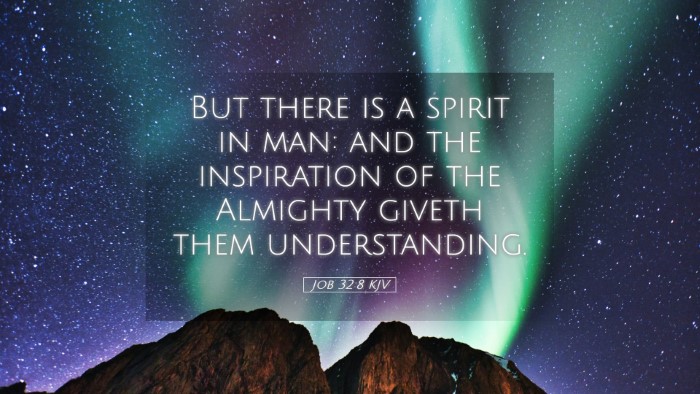Old Testament
Genesis Exodus Leviticus Numbers Deuteronomy Joshua Judges Ruth 1 Samuel 2 Samuel 1 Kings 2 Kings 1 Chronicles 2 Chronicles Ezra Nehemiah Esther Job Psalms Proverbs Ecclesiastes Song of Solomon Isaiah Jeremiah Lamentations Ezekiel Daniel Hosea Joel Amos Obadiah Jonah Micah Nahum Habakkuk Zephaniah Haggai Zechariah MalachiJob 32:8
Job 32:8 KJV
But there is a spirit in man: and the inspiration of the Almighty giveth them understanding.
Job 32:8 Bible Commentary
Commentary on Job 32:8
Verse: "But there is a spirit in man: and the inspiration of the Almighty giveth them understanding." (Job 32:8, KJV)
Introduction
This verse comes from the speech of Elihu, a young friend of Job, who enters the discourse after the three older friends have concluded their arguments. Elihu presents a unique perspective on suffering, divine justice, and the role of the Spirit in understanding truth. This commentary delves into the insights provided by prominent public domain commentators to enrich the understanding of this significant verse.
Insights from Matthew Henry
Matthew Henry emphasizes the vital role of the human spirit in discerning knowledge and wisdom. He notes that:
- Divine Inspiration: The phrase "there is a spirit in man" signifies that human beings possess an inherent faculty that can connect with the divine. This spirit is not merely about intellect but is an avenue through which God communicates understanding.
- Illumination by the Almighty: The "inspiration of the Almighty" suggests a supernatural influence that illuminates human understanding. Henry remarks that such inspiration is essential for perceiving and apprehending profound truths that surpass human wisdom.
- Contrast with Age and Wisdom: Elihu’s assertion is particularly significant considering the context—older friends relied on their experience and tradition, yet Elihu introduces a reminder that spiritual insight can come from a youthful disposition, guided by divine influence.
Insights from Albert Barnes
Albert Barnes further explores the implications of the verse concerning the innate understanding placed within humanity:
- The Nature of Spirit: Barnes interprets "spirit" as representing the rational soul and its capacity for comprehending deeper truths. He argues that it is this spirit that distinguishes humans from the beasts of the field, allowing them to engage with God’s revelation.
- God’s Role in Understanding: He emphasizes that inspiration from God is necessary for true wisdom. Barnes points out that all knowledge and understanding ultimately stem from God’s enlightening influence upon the human mind, which encourages reliance on divine revelation over mere human reasoning.
- Universal Application: The assertion that God’s Spirit gives understanding is not limited to Job or Elihu’s contemporaries but extends to all humanity, reinforcing the idea that every person can seek and receive divine wisdom.
Insights from Adam Clarke
Adam Clarke provides a thorough examination of both the textual and theological underpinning of this verse:
- Textual Analysis: Clarke discusses the Hebrew terms used in the verse, noting that "spirit" has connotations of both breath and the rational soul, thus highlighting the dual nature of human existence.
- Understanding through Revelation: His commentary stresses that understanding is not a product of human effort alone but is a gift bestowed by God. God's active presence in the world ensures that humans are not left to their own devices for understanding reality.
- Theological Implications: Clarke asserts that this divine inspiration serves a critical purpose in bringing sinners to repentance and helping the faithful in their pursuit of righteousness and understanding God’s ways.
Theological Themes
Integrating the insights from Henry, Barnes, and Clarke reveals several key theological themes:
- The Dichotomy of Wisdom: The coexistence of human and divine wisdom underscores the limitations of human understanding without the influence of the Holy Spirit.
- The Role of the Spirit: The human spirit as an instrument of divine inspiration affirms the belief in an interactive relationship between humanity and the divine, where God empowers and enlightens mankind.
- Humility in Understanding: The notion that true understanding comes from God encourages humility among scholars, theologians, and spiritual leaders, reminding them that wisdom is a gift rather than solely an achievement.
Conclusion
Job 32:8 encapsulates a profound truth about the human condition and the necessity of divine assistance in understanding life’s complexities. Elihu’s proclamation serves as a reminder that amidst suffering and doubts, the light of God's inspiration is available to all who seek knowledge through faith. Therefore, pastors, students, theologians, and scholars are encouraged to immerse themselves in prayer and surrender to the leading of the Spirit, trusting that true understanding will not depend solely on human wisdom but will be revealed through divine inspiration.


